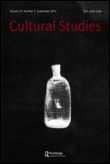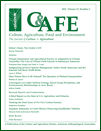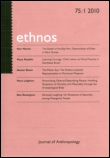
Etnoloska Tribina
Scope & Guideline
Diving Deep into Cultural Phenomena and Anthropological Insights
Introduction
Aims and Scopes
- Ethnographic Research:
The journal promotes in-depth ethnographic studies that explore social practices, cultural identities, and community dynamics, particularly in the Balkan region and beyond. - Cultural Heritage and Memory:
A consistent focus on heritage, memory, and the impact of historical events on contemporary societies is evident, with research examining how communities remember and reinterpret their past. - Social Impact of Arts and Culture:
The journal explores the role of arts and culture in shaping social identities and addressing contemporary social issues, including migration, integration, and community resilience. - Health and Wellbeing:
Research on health practices, including the experiences of marginalized groups, and the intersection of culture and health is a prominent theme, reflecting the journal's commitment to social justice. - Sustainability and Environment:
There is a growing emphasis on sustainability, particularly in relation to food systems, urban gardening, and environmental practices, indicating a commitment to addressing ecological concerns within cultural contexts.
Trending and Emerging
- Migration and Refugee Studies:
An increasing number of articles focus on the experiences of migrants and refugees, examining their social integration, cultural identity, and the impact of displacement on communities, reflecting global migration trends. - Sustainable Practices and Food Systems:
The Mediterranean diet and sustainable food practices are gaining attention, emphasizing cultural approaches to sustainability and health, which resonate with global movements towards ecological awareness. - Health Equity and Social Justice:
Research addressing the healthcare experiences of marginalized populations, particularly sexual and gender minorities, is emerging as a significant area of focus, underlining the journal's commitment to social equity. - Urban Anthropology and Community Resilience:
There is a growing interest in urban studies, particularly regarding community responses to urban challenges, such as gentrification and environmental sustainability, reflecting contemporary urban issues. - Interdisciplinary Approaches:
The journal is increasingly publishing works that incorporate interdisciplinary methodologies, blending anthropology with other fields like sociology, environmental studies, and cultural studies, to provide richer analyses of complex social phenomena.
Declining or Waning
- Traditional Ethnographic Narratives:
Research focusing solely on traditional narratives and folklore appears to be decreasing, possibly as scholars shift towards more contemporary social issues and interdisciplinary approaches. - Historical Studies with Limited Contemporary Relevance:
Papers that delve deeply into historical events without connecting them to present-day implications or social dynamics are becoming less frequent, suggesting a move towards more applied ethnographic work. - Monocultural Perspectives:
There is a noticeable decline in studies that take a monocultural viewpoint, as the journal increasingly embraces multicultural and transnational analyses, reflecting the complexity of modern societies.
Similar Journals

Social Analysis
Advancing Critical Insights in Social ResearchSocial Analysis, an esteemed academic journal published by BERGHAHN JOURNALS, is at the forefront of interdisciplinary research, focusing on the dynamic intersections of anthropology, cultural studies, sociology, and the arts and humanities. Since its inception in 2002 and having transitioned to an Open Access model in 2020, the journal ensures that critical social research is widely accessible to scholars and the public alike. With an impressive Q1 ranking in Anthropology and cultural studies and holding a notable Q2 in Sociology and Political Science, it garners attention from a large academic audience, as evidenced by its high Scopus rankings: 10th in general arts and humanities and 153rd in cultural studies. This signifies its influential role in shaping contemporary discourse and providing a platform for innovative ideas and methodologies in understanding social phenomena. Based in Brooklyn, NY, the journal is dedicated to fostering scholarly dialogue and advancing the field, making it an essential resource for researchers, professionals, and students eager to engage with and contribute to the field of social analysis.

CULTURAL STUDIES
Pioneering Research in Cultural StudiesCULTURAL STUDIES, published by Routledge Journals, Taylor & Francis Ltd, is a prestigious academic journal dedicated to the exploration and analysis of cultural phenomena across diverse contexts. With an ISSN of 0950-2386 and an E-ISSN of 1466-4348, this journal has established itself as a leading platform for scholars, researchers, and practitioners interested in the intersections of culture, identity, and society. Since its inception, CULTURAL STUDIES has transitioned through several converged years of publication, currently producing cutting-edge research that reflects its strong positions in Q1 quartiles across multiple disciplines, including Anthropology, Social Sciences, and Arts and Humanities. With an impressive Scopus rank of 75/1304 in Cultural Studies, the journal is an essential resource for those seeking to engage with the latest theoretical frameworks and methodologies in understanding cultural dynamics. Although it is not currently open access, CULTURAL STUDIES remains a critical vessel for disseminating knowledge that impacts both academic and practical applications in cultural analysis. For scholars and students eager to contribute to this vibrant field, the journal serves not only as a repository of knowledge but also as an inspiration for further inquiry into the complexities of culture.

Revista de Etnografie si Folclor-Journal of Ethnography and Folklore
Fostering Dialogue on Cultural Dynamics and PracticesRevista de Etnografie si Folclor-Journal of Ethnography and Folklore, an esteemed publication by EDITURA ACAD ROMANE, serves as a vital platform for the dissemination of research and scholarship in the fields of anthropology and cultural studies. Established in Romania, this journal has committed itself to exploring the rich tapestry of ethnographic practices and folklore traditions, favoring interdisciplinary approaches that illuminate the diverse cultural heritage of societies. With an ISSN of 0034-8198, the journal has been instrumental in fostering academic dialogue and engaging researchers, professionals, and students alike. Though currently classified in the Q4 category of both anthropology and cultural studies, its continued growth from 2014 to 2024 signals an evolving contribution to understanding cultural dynamics. Accessible via traditional publication means, the journal encourages contributions that deepen the understanding of ethnographic methodologies and cultural narratives, thereby enriching the academic landscape.

POSTMODERN CULTURE
Unraveling the Threads of Postmodern ThoughtPOSTMODERN CULTURE, published by Johns Hopkins University Press, is a pivotal journal in the fields of Cultural Studies, Literature and Literary Theory, and the Visual Arts and Performing Arts. With a focus on the nuances of postmodern theory and its interdisciplinary applications, the journal has established itself as an essential resource for researchers and scholars seeking to explore contemporary cultural phenomena through innovative critical lenses. Compiling works from 2002 to 2023, it is indexed with notable rankings, including Q2 in Literature and Literary Theory and Q3 in Cultural Studies, reflecting its significant contribution to persistent academic discourse. While not open access, the journal ensures that access to groundbreaking research is available to libraries and institutions, reinforcing its importance in the scholarly community. POSTMODERN CULTURE serves not only as a repository of academic inquiry but also as a catalyst for new ideas, stimulating dialogue among professionals and students alike in understanding the complexities of today's cultural landscape.

Anthropology Today
Exploring the Depths of Human CulturesAnthropology Today, published by WILEY, is a leading peer-reviewed journal in the field of anthropology, boasting a distinguished Q1 category ranking in the 2023 evaluations and a notable position within the top 79th percentile of its discipline according to Scopus. Established in the United States, this journal offers a rich compendium of contemporary anthropological research, covering diverse topics that shape the understanding of human cultures and societies. It is recognized for its rigorous academic standards and commitment to publishing innovative studies that reflect current trends and discussions within the field. While the journal is not open access, it provides insightful articles and reviews that are indispensable for researchers, professionals, and students seeking to enhance their knowledge and stay updated with the latest anthropological findings and theoretical advancements.

Ethnologies
Unveiling the Stories Behind Cultural ExpressionsEthnologies is a peer-reviewed academic journal published by the Folklore Studies Association of Canada, dedicated to advancing the field of ethnology and cultural studies. With its ISSN 1481-5974 and E-ISSN 1708-0401, this journal seeks to bridge the gap between theoretical frameworks and empirical research, promoting interdisciplinary dialogue among scholars and practitioners alike. The journal aims to highlight the rich diversity of human experience and cultural expression, making significant contributions to both academic communities and public understanding. Although currently not an open access publication, Ethnologies is known for its rigorous peer-review process and high-impact research articles. Situated in St. Johns, Newfoundland and Labrador, it serves as a vital resource for researchers, professionals, and students dedicated to exploring the complexities of culture and community in a global context.

Annual Review of Anthropology
Navigating the Landscape of Cultural StudiesAnnual Review of Anthropology is a premier journal published by Annual Reviews, dedicated to providing comprehensive and authoritative reviews in the field of anthropology. Established with the goal of synthesizing essential research findings, this influential publication not only shapes contemporary anthropological discourse but also facilitates interdisciplinary dialogue within the broader realm of social sciences and cultural studies. With an impressive impact factor that places it in the Q1 category across multiple classifications, including Anthropology and Arts and Humanities, this journal is highly regarded by researchers and academics alike. The Annual Review of Anthropology has been a trusted resource for critical insights and transformative ideas, helping to advance the understanding of human societies from 1980 to the present. Although it does not offer open access, access to its articles is available through various academic institutions, ensuring that both seasoned scholars and students can benefit from its wealth of knowledge. With a Scopus ranking placing it in the top percentiles for relevant subjects, this journal is essential reading for anyone looking to stay at the forefront of anthropological research.

Slovensky Narodopis-Slovak Ethnology
Unveiling Ethnological Insights from SlovakiaSlovensky Narodopis-Slovak Ethnology is a leading academic journal dedicated to the exploration of ethnology and cultural studies, published by the Slovak Academy of Sciences at the Institute of Ethnology. With an Open Access policy since 2013, it strives to make high-quality research readily accessible to a global audience, enhancing the dialogue around Slovak cultural heritage and broader anthropological topics. The journal holds a notable position in the field, currently ranked Q2 in anthropology for 2023, indicating its substantial contribution to the discipline. It is indexed in Scopus, with a current rank of 245 out of 502 in the Social Sciences category, reflecting its value within the academic community. Researchers and students alike can look forward to a rich array of original research articles, reviews, and essays that not only delve into Slovak ethnology but also engage with international perspectives, thereby enriching the understanding of cultural dynamics and practices.

Culture Agriculture Food and Environment
Connecting Cultures through Agriculture and Environmental InsightsCulture Agriculture Food and Environment, published by WILEY, is an esteemed journal that serves as a pivotal platform for interdisciplinary research at the intersection of cultural studies, anthropology, and agricultural sciences. With its ISSN 2153-9553 and E-ISSN 2153-9561, this journal aims to foster scholarly dialogue on the complex relationships between food, culture, and environmental sustainability. As of 2023, it proudly holds a Q2 ranking in Agricultural and Biological Sciences and Anthropology, as well as a Q1 ranking in Cultural Studies, indicating its significant impact within these disciplines. Researchers and professionals will appreciate its rigorous peer-review process and diverse coverage, which extends from 2011 to 2024, reflecting ongoing debates and innovations in the field. Although open access options are not provided, the journal's commitment to advancing knowledge in understanding food systems and cultural practices makes it a vital resource for academics and practitioners alike, promoting a deeper understanding of the cultural dimensions of agriculture and the environment.

ETHNOS
Where Anthropology Meets Archaeological InsightETHNOS is a leading journal published by Routledge Journals, Taylor & Francis Ltd, dedicated to advancing the field of anthropology and archaeology. With an impressive impact factor reflected in its high Scopus rankings—#23 in Archaeology and #44 in Anthropology—the journal is recognized for its rigorous scholarship and its influence on contemporary discussions in social science. Operating since 1936, ETHNOS provides a vital platform for innovative research and theoretical discourse, making it an essential resource for professionals, academics, and students alike. Although it does not offer Open Access, its meticulous editorial standards and Q1 classification in both Anthropology and Archaeology guarantee substantive contributions to the study of culture and society. Located in the United Kingdom, the journal continues to shape the narratives surrounding social and cultural phenomena, enriching the academic landscape up to 2024 and beyond.